- August 26, 2025
- KT Global School
- 0
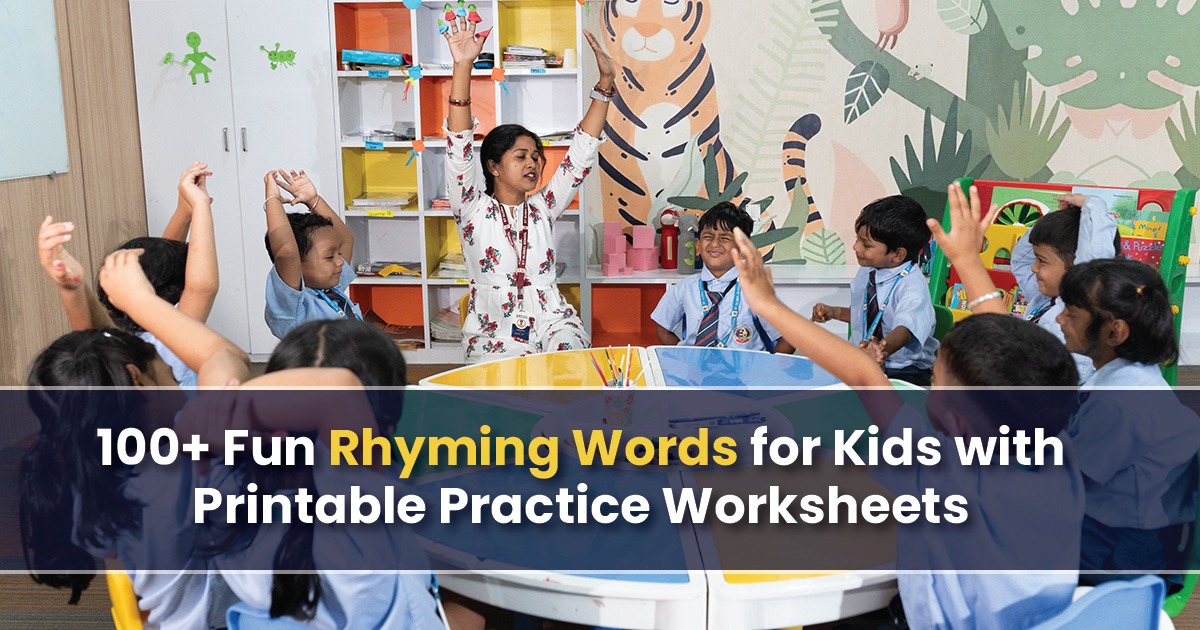
Introduction: Welcome to the Rhyming Fun Zone!
Hey there, little word wizards and future poets! Ready to play with words and have some fun? Rhyming isn’t just for song lyrics and poems—it’s a magical way to help you build your vocabulary, sharpen your reading skills, and even make up your own silly songs! Whether you’re a beginner or already a rhyme master, we’ve got 100+ rhyming words to share, along with cool printable worksheets to make practice feel like playtime. Let’s dive into the world of rhyming—it’s going to be a blast!
At KT Global School, we believe that learning should feel like an adventure. And what better way to learn than with a little rhythm and rhyme?
Why Are Rhyming Words Important for Kids?
Before we start rhyming like pros, let’s talk about why rhyming is such a big deal when it comes to learning.
1- Phonemic Awareness – Fancy term alert! This means being able to hear the sounds in words. Rhyming helps you hear how words are similar and different. “Cat,” “bat,” and “hat” all share the same sound at the end, which helps you read and spell better!
2- Vocabulary Boost – The more you rhyme, the more words you learn! Rhymes introduce you to new words you might not have known yet. And, let’s face it, knowing tons of words makes you feel like a word superhero!
3- Memory Magic – Rhymes are catchy! They stick in your brain, which helps you remember words and their spellings. Have you ever tried remembering the alphabet? It’s easier because of the rhyme!
4- Creativity Explosion – Rhyming makes you creative! You can write poems, make up songs, and tell fun stories all by playing with words. Who knows? You might be the next rhyming genius!
5- Spelling Skills – Rhyming words help you figure out spelling patterns. For example, when you learn that “cat,” “bat,” and “hat” all have the same ending, you can guess how to spell similar words!
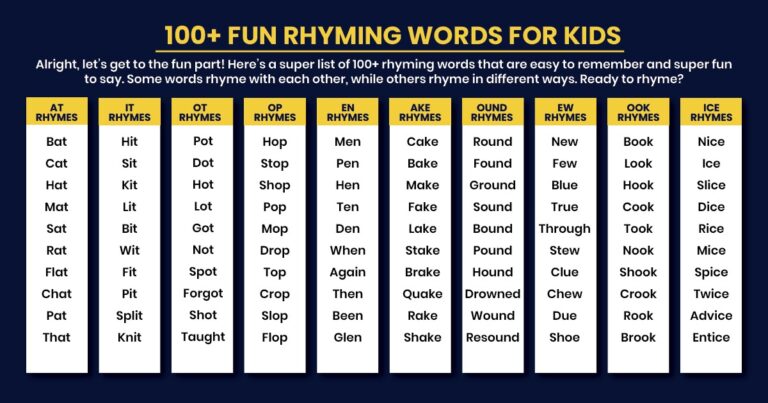
Printable Practice Worksheets for Rhyming Words
Now that we’ve got our rhyme game going, let’s make sure you’re all set to practice. Here are a few fun worksheet ideas that will help you take your rhyming skills to the next level. Grab a pencil and get ready to rhyme!
Worksheet Ideas:
1- Rhyming Match-up:
Create two columns: One with words like “cat” and the other with words like “hat.” Draw lines to match the rhyming pairs.
2- Fill-in-the-Rhyme:
Write a sentence with a blank spot, like “The cat sat on the ______.” Kids will fill in the blank with the correct rhyming word, like “mat.”
3- Rhyming Word Search:
Make a word search filled with words from our rhyming list! Challenge kids to find all the hidden rhymes.
4- Write Your Own Rhymes:
Give kids a set of rhyming words and ask them to write a fun poem or story using as many of those words as possible.
5- Picture Rhymes:
Show a picture of a cat, and ask kids to draw a line to the picture of something that rhymes, like a hat!
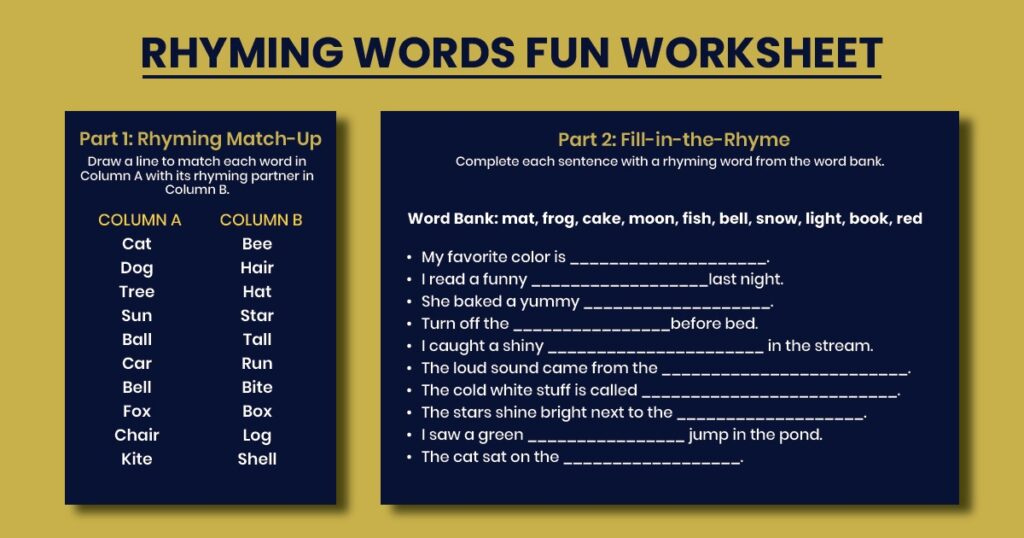
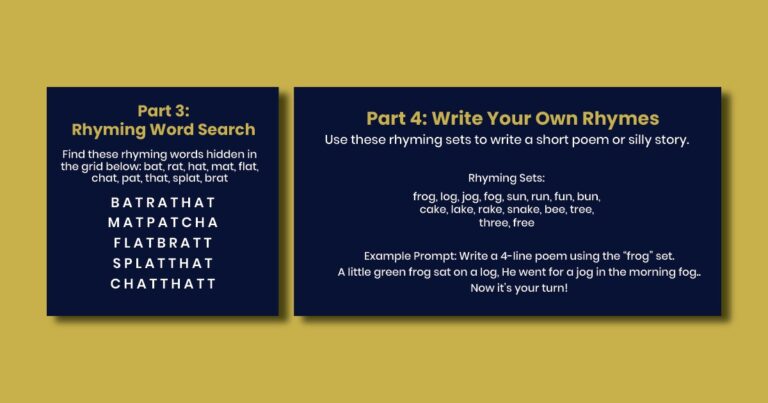
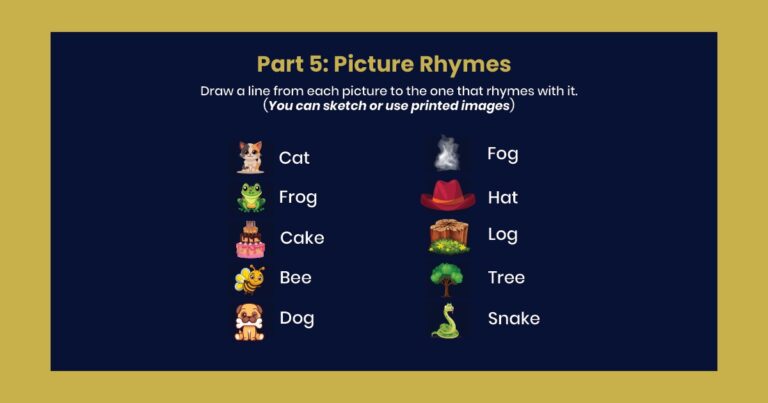
Fun Rhyming Games for Kids
Want to make rhyming even more exciting? Here are a few fun games that will get kids excited about rhyming!
1-Rhyming Memory Match:
Create pairs of rhyming words on cards (like “bat” and “hat”) lay them face down, and take turns flipping over two cards to find matching rhymes!
2-Rhyming Scavenger Hunt:
Set up a scavenger hunt where kids find objects that rhyme with a given word. For example, “Can you find something that rhymes with ‘book’?”
3-Rhyming Relay:
Split the class into two teams. Call out a word (like “dog”), and the teams must come up with as many rhymes as they can. The team with the most rhyming words wins!
4-Sing Your Rhymes:
Rhymes and music go hand in hand. Challenge kids to write their own rhyming songs and perform them for the class.
How to Teach Rhyming Words to Kids (Tips for Parents and Teachers)
1-Read Rhyming Books:
Books like The Cat in the Hat by Dr. Seuss or Brown Bear, Brown Bear, What Do You See? are packed with rhymes and make for fun reading sessions!
2-Sing Fun Songs:
Play rhyming songs and sing along. The rhythm and melody will help kids remember the rhymes faster.
3-Encourage Creativity:Let kids come up with their own rhymes! Start with a word like “rain,” and ask them to come up with rhyming words.
4- Keep It Playful:
Turn rhyming into a fun game. The more fun and playful the activity, the more kids will want to participate!
Conclusion: Keep the Rhyme Party Going!
Rhyming isn’t just about words that sound the same—it’s about playing with language and letting your imagination run wild! With our 100+ fun rhyming words, printable worksheets, and engaging games, your child will be rhyming in no time. At KT Global School, we believe that learning can be just as fun as it is educational.
So, are you ready to rhyme? Let’s get started and make language learning one big adventure!
